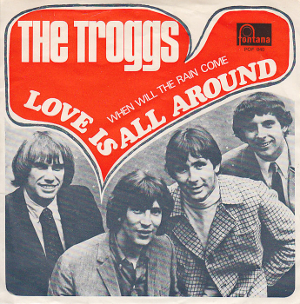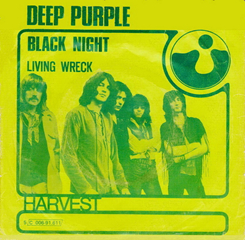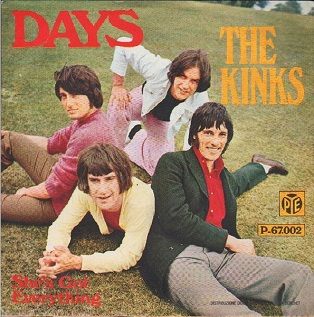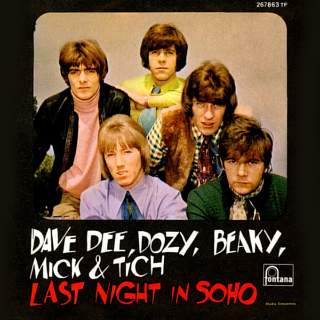Related Research Articles

"Eloise" is a song first released in 1968 on the MGM label. It was sung by Barry Ryan, and written by his twin brother Paul Ryan. Running for over five minutes, it features strong orchestration, melodramatic vocals, and a brief slow interlude. It sold three million copies worldwide, and reached No. 2 in the UK Singles Chart as published by Record Retailer, but hit No. 1 in the NME and Melody Maker charts. It topped the chart in 17 countries, including Italy, the Netherlands and Australia.

"Love Is All Around" is a song recorded by English rock band the Troggs. Released as a single in October 1967, it was a top-ten hit in both the UK and US.

"Rocket" is a song recorded by English rock band Def Leppard in 1987 from the album Hysteria. It was released in January 1989 as the seventh and final single from the album and reached the Top 15 on the US Billboard Hot 100 and UK Singles Chart. It is the band’s final single to be released with guitarist Steve Clark before his death in 1991.
"Cotton Fields (The Cotton Song)" (also known as In Them Old Cotton Fields Back Home) is a song written by American blues musician Huddie Ledbetter, better known as Lead Belly, who made the first recording of the song in 1940.

"Black Night" is a song by English hard rock band Deep Purple, released as a single in June 1970 and later included on the 25th Anniversary version of their 1970 studio album, Deep Purple in Rock. It became a hit following its release, peaking at No. 1 on UK New Musical Express, Melody Maker and Top Pops charts, and remains Deep Purple's highest charting UK single. It topped the charts in Switzerland, and is one of only two singles from the band to chart in Ireland, peaking at No. 4, thus making it the group's only Irish Top 10 hit. It was also the second non-album single penned by the band and also reached number 6 in South Africa.

"Days" is a song by the English rock band the Kinks, written by Ray Davies. It was released as a non-album single in June 1968. It also appeared on an early version of the album The Kinks Are the Village Green Preservation Society. It now appears as a bonus track of the remastered CD. On the original Pye 7N 17573 label, the name of the song is "Day's" owing to a grammatical error.

"With a Girl Like You" is a song by English rock band the Troggs, released as a single in July 1966. On the back of the success of "Wild Thing", "With a Girl Like You" topped the charts in the UK, and was similarly a success across Europe, but did not fare as well in the US, only peaking at number 29 on the Billboard Hot 100.

"Can't Stay Away from You" is a song by Gloria Estefan and Miami Sound Machine. The song was released in November 1987 by Epic as the third single from their multi-platinum album, Let It Loose (1987). It became the group's fifth top 10 hit in the United States, peaking at #6 on the US Billboard Hot 100 chart; it was their second #1 hit on the adult contemporary chart, following 1986's "Words Get in the Way". The song originally peaked at #88 on the UK Singles Chart in May 1988, however the song was re-released after the success of its follow-up, "Anything for You", peaking at #7 in March 1989.

"Give It to Me" is a song by English rock band the Troggs, released as a single in February 1967. In the UK, it peaked just outside the top ten, ending their run of consecutive top-ten hits.

"Big Ship" is a song by Cliff Richard, released as a single in May 1969. It peaked at number 8 on the UK Singles Chart.

"Good Times (Better Times)" is a song by Cliff Richard, released as a single in February 1969. It peaked at number 12 on the UK Singles Chart.

"Non illuderti mai" is a song by Italian singer Orietta Berti, released as a single in April 1968 for the summer festival Un disco per l'estate. The song came in second place at the festival behind "Luglio" by Riccardo Del Turco. It has notably been covered in English as "My Little Lady" by the Tremeloes and in French as "Ma bonne étoile" by Joe Dassin.

"Uno tranquillo" is a song by Italian singer Riccardo Del Turco, released as a single in 1967. The song is notable for being covered in English as "Suddenly You Love Me" by the Tremeloes and in French as "Siffler sur la colline" by Joe Dassin.

"The Wreck of the 'Antoinette'" is a song by Dave Dee, Dozy, Beaky, Mick & Tich, released as a single in September 1968. It peaked at number 14 on the UK Singles Chart.

"Hello World" is a song written by Tony Hazzard. It was recorded and released as a single by the Tremeloes in March 1969 and peaked at number 14 on the UK Singles Chart.

"Last Night in Soho" is a single by English pop band Dave Dee, Dozy, Beaky, Mick & Tich, released by Fontana on 28 June 1968. Written by the band's regular songwriters Ken Howard and Alan Blaikley, it was the follow-up to the chart topper "The Legend of Xanadu" and gave the band their final top-ten placing on the UK Singles Chart, reaching number 8.
"I'll Come Running" is a song written by Neil Diamond. It was first released by Diamond in July 1966 as the B-side to his US top-ten single "Cherry, Cherry", before being included on his debut album The Feel of Neil Diamond, released in August 1966. The song was later covered by Cliff Richard and released as a single in June 1967; it peaked at number 26 in the UK Singles Chart.
"Callow-la-vita" is a song by British band Raymond Froggatt released as their debut single in April 1968. It was not successful in the UK, but became very successful in the Netherlands. It became more successful after being covered by the Dave Clark Five as "The Red Balloon".

"(Call Me) Number One" is a song by British group the Tremeloes, released as a single in October 1969. It peaked at number two on the UK Singles Chart.

"I Wouldn't Trade You for the World" is a song by Irish pop group The Bachelors, released as a single in August 1964. It reached number-one in Ireland, became a top-ten hit in the UK and peaked in the top-100 in the US.
References
- ↑ "Friends (Arrival) – Jon Kutner" . Retrieved 2021-07-19.
- 1 2 "Arrival: Artist Chart History". Official Charts Company.
- ↑ "Singles" (PDF). New Musical Express . 6 December 1969. p. 8. Retrieved 19 July 2021.
- ↑ "Jon Lord on the latest sounds in Blind Date" (PDF). Melody Maker . 6 December 1969. p. 20. Retrieved 19 July 2021.
- ↑ "The Irish Charts – Search Results – Friends". Irish Singles Chart.
- ↑ Kimberley, C. Zimbabwe: Singles Chart Book. Harare: C. Kimberley, 2000